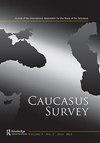Introduction: Rethinking Memory Sites and Symbolic Realms of Georgian National Identity
IF 0.5
Q3 AREA STUDIES
引用次数: 1
Abstract
The study of memory, and of history, grew alongside the nationalist revival in the 1980s and 1990s. The bloody conflicts in the Balkans and the collapse of communism in Eastern and Central Europe, revived academic interest in nationalism, and with it an examination of how “useable pasts” could be exploited and manipulated by nationalist elites. The study of memory and its relationship to history and identity underwent a period of “creative and intensive development” in the 1990s (Tota and Hagen 2016, 1). In post-Soviet states, national identity and memory were inextricably linked to the risk of social “amnesia or forgetfulness” (Simine 2013, 14). The forgetting of history and the erasure of memory was central to Soviet life before 1991. Pierre Nora’s assertion that “we speak so much of memory because there is so little of it left” (Simine 2013, 14; Nora 1989, 7), can also describe the great anxiety experienced by Georgians to this day. The interest in memory studies in Georgia emerged after the collapse of the Soviet Union. The new national governments (and the Orthodox Church) embarked on reviving pre-Soviet memory, constructing a new story of national beginnings, intertwined with heroic kings and saints. Bringing back “lost” historical memories became central to the domestic contest between Georgia’s political parties, as well as to the reinterpretation of Georgia’s relations with Russia and Europe. For example, the “silenced”memories of the Democratic Republic of Georgia (DRG) (1918-1921) became an effective mnemonic bridge, which connected the new independent state after 1991 with its democratic and pro-European predecessor. New political elites in the early 1990s instrumentalized the short-lived Georgian republic in 1918-21, whose existence was ended by the Red Army, as a foundation for the legitimate restoration of Georgia’s independence in 1991. Historical analogy was a mnemonic tool which represented Russia (and not just the Soviet Union) as a historical aggressor and occupier. However, in the 2000s, the DRG was forgotten once more, this time the victim of a neo-liberal ideology which rejected the DRG’s social democratic foundations (Jones 2021). But during the RussoGeorgian war in 2008, parallels between the Soviet Russian occupation in 1921 and the attack in 2008 were reiterated in the media to aid the mobilization of national sentiments around the common threat to the country’s territorial integrity (Toria 2014). The DRG was revived as a “usable past.”引言:重新思考格鲁吉亚民族身份的记忆场所和象征领域
对记忆和历史的研究,随着20世纪80年代和90年代民族主义的复兴而发展起来。巴尔干半岛的血腥冲突和东欧和中欧共产主义的崩溃,重新燃起了学术界对民族主义的兴趣,并由此审视了民族主义精英如何利用和操纵“可用的过去”。对记忆及其与历史和身份的关系的研究在20世纪90年代经历了一段“创造性和密集发展”的时期(Tota和Hagen 2016, 1)。在后苏联国家,民族认同和记忆与社会“健忘症或遗忘”的风险密不可分(Simine 2013, 14)。对历史的遗忘和对记忆的抹去是1991年前苏联生活的核心。皮埃尔·诺拉(Pierre Nora)断言,“我们说了这么多记忆,因为剩下的记忆太少了”(Simine 2013, 14;诺拉(1989,7)也可以描述格鲁吉亚人至今所经历的巨大焦虑。对格鲁吉亚记忆研究的兴趣是在苏联解体后出现的。新的国家政府(和东正教)着手恢复前苏联的记忆,构建一个与英勇的国王和圣人交织在一起的国家起源的新故事。找回“失去的”历史记忆成为格鲁吉亚各政党之间国内斗争的核心,也是重新解读格鲁吉亚与俄罗斯和欧洲关系的核心。例如,对格鲁吉亚民主共和国(DRG)(1918-1921)的“沉默”记忆成为有效的记忆桥梁,将1991年后新独立的国家与其民主和亲欧的前身联系起来。在20世纪90年代早期,新的政治精英把1918年至1921年短暂的格鲁吉亚共和国(它的存在被红军终结)作为1991年格鲁吉亚合法恢复独立的基础。历史类比是一种助记工具,它代表了俄罗斯(不仅仅是苏联)作为历史上的侵略者和占领者。然而,在2000年代,DRG再次被遗忘,这一次是新自由主义意识形态的受害者,这种意识形态拒绝了DRG的社会民主基础(Jones 2021)。但在2008年的俄格战争期间,媒体反复将1921年的苏俄占领与2008年的袭击相提并论,以帮助动员围绕国家领土完整的共同威胁的民族情绪(Toria 2014)。DRG作为一个“可用的过去”而复活。
本文章由计算机程序翻译,如有差异,请以英文原文为准。
求助全文
约1分钟内获得全文
求助全文
来源期刊

Caucasus Survey
Arts and Humanities-History
CiteScore
1.30
自引率
9.10%
发文量
4
期刊介绍:
Caucasus Survey is a new peer-reviewed, multidisciplinary and independent journal, concerned with the study of the Caucasus – the independent republics of Armenia, Azerbaijan and Georgia, de facto entities in the area and the North Caucasian republics and regions of the Russian Federation. Also covered are issues relating to the Republic of Kalmykia, Crimea, the Cossacks, Nogays, and Caucasian diasporas. Caucasus Survey aims to advance an area studies tradition in the humanities and social sciences about and from the Caucasus, connecting this tradition with core disciplinary concerns in the fields of history, political science, sociology, anthropology, cultural and religious studies, economics, political geography and demography, security, war and peace studies, and social psychology. Research enhancing understanding of the region’s conflicts and relations between the Russian Federation and the Caucasus, internationally and domestically with regard to the North Caucasus, features high in our concerns.
 求助内容:
求助内容: 应助结果提醒方式:
应助结果提醒方式:


